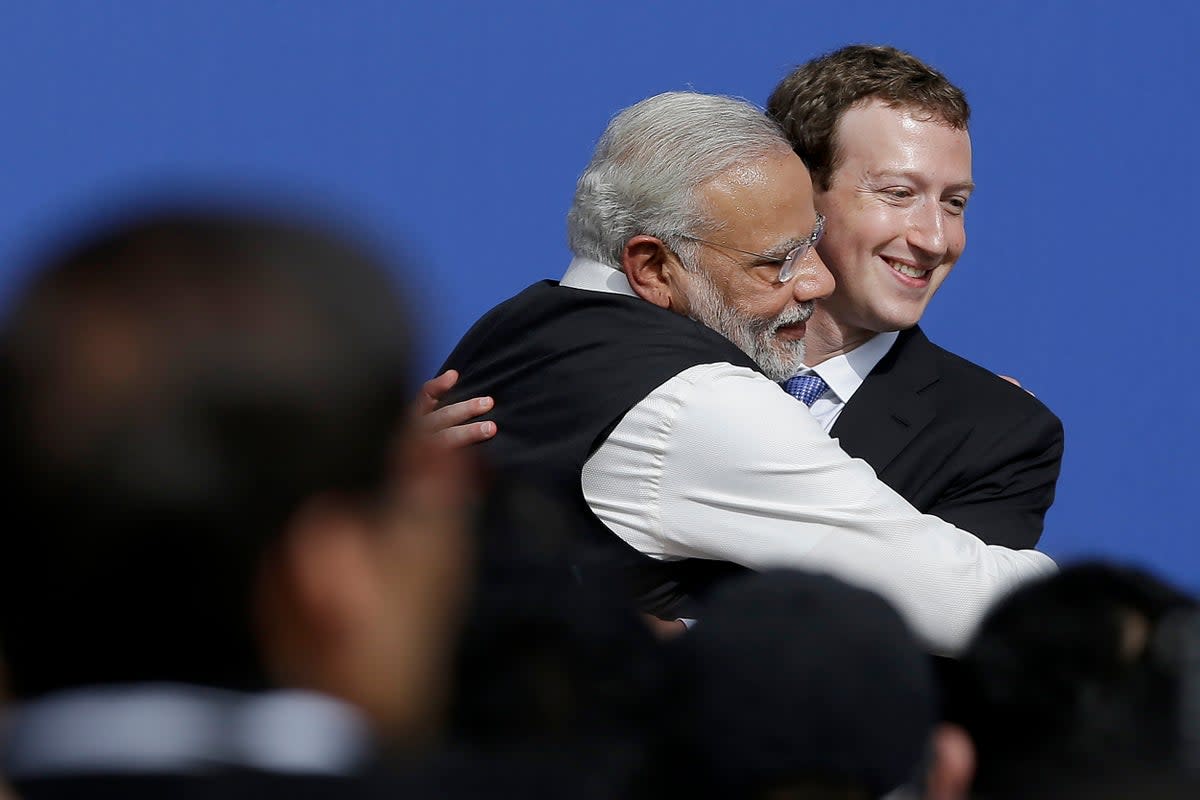Meta and media outlet The Wire lock horns over exposé on platform favouring India’s ruling party

- Oops!Something went wrong.Please try again later.
Social media giant Meta has slammed an exposé carried out by an Indian media outlet on its practices as “outlandish” after it was claimed that the company favoured Narendra Modi’s Bharatiya Janata Party by removing critical posts through its XCheck programme.
The social media giant, which has repeatedly been accused of several wrongdoings by whistleblowers, including favouring certain governments, has denied a series of allegations made by Indian news outlet The Wire in two back-to-back reports this week.
On Monday, the outlet came out with its first exposé, claiming Meta had allegedly granted Amit Malvita, a BJP member heading the party’s IT cell, the unchecked ability to remove content from its platforms.
The report said this was done as part of Meta’s XCheck (read Crosscheck) programme – a privilege granted to VIP users, which was first reported upon by the Wall Street Journal last year.
The Wire based its investigation on seven posts by a satirical account with the handle @cringearchivist.
The posts were critical of the BJP chief minister of India’s largest state, Yogi Adityanath, and were removed by Meta, bizarrely under the platform’s “nudity and sexual content” guidelines.
The platform reported, citing unnamed sources within Meta, that the company had taken down the post criticising Mr Adityanath “without any of the company’s moderators looking at it” because Mr Malviya had flagged it.
The company was quick to rubbish the claims. A Meta spokesperson on Tuesday called the report “inaccurate”.
Meta policy communications director Andy Stone tweeted that XCheck status “has nothing to do with the ability to report posts”.
“The posts in question were surfaced for review by automated systems, not humans. And the underlying documentation appears to be fabricated,” Mr Stone tweeted.
But soon after, the portal published another report to back up its reportage, including a picture of an alleged email sent by Mr Stone to Meta’s internal teams asking how the document got leaked.
The picture also suggested Mr Stone demandedThe Wire’s reporter and editor, Jahnavi Sen and Siddharth Varadarajan, be put on a “watchlist” so communications to them from Meta staff can be monitored.
The claim has raised an alarm among the journalistic community online, which has questioned whether the social media giant monitors the communications of media outlets and reporters.
Meta again issued a clarification, suggesting the email was fake.
In a series of tweets, Meta’s chief security information officer Guy Rosen, said: “The supposed email address from which it was sent isn’t even Stone’s current email address, and the ‘to’ address isn’t one we use here either. There is no such email.”
“That same story makes reference to an internal journalist ‘watchlist.’ There is no such list.”
The story and Facebook’s reaction has left experts divided.
The company’s claim that it does not use the FB.com address anymore was questioned by several journalists who have received emails from the firm in the last few weeks.
I have no idea what's going on here/don't have any stance on the underlying story at this point but I will say Andy emailed me from an @fb.com account on 8/31/22
— Sam Biddle (@samfbiddle) October 11, 2022
However, several people who have raised questions about Facebook’s internal workings in the past, have also raised doubts over the authenticity of The Wire’s story.
Sophie Zhang, a former whistleblower who accused the company of not acting against a BJP lawmaker’s network of bots, said the documents appeared “clearly faked”.
The Wire's reports are based upon documents that are by now clearly faked.
But how did we get to this point? Newsroom incentives mean that press outlets face increasing pressure to write hip exciting articles that fit into the zeitgeist. Rigor doesn't get clicks or cash. https://t.co/CJoDGNO7we— Sophie Zhang(张学菲) (@szhang_ds) October 12, 2022
I don't think there's a single former FB person who believes the Wire's docs are authentic.
I probably came the closest - I was open to it at the start because I try to avoid kneejerk conclusions, and partly discounted my knowledge as incomplete/out of date. My mistake.— Sophie Zhang(张学菲) (@szhang_ds) October 11, 2022
ButThe Wire’s editor, Siddharth Varadarajan, who was also named in the purpoted email by Mr Stone, has said the news portal stands by its expose and has demanded that Facebook clarify why posts critical of Mr Adityanath were removed.
Mr Varadarajan shared some details about The Wire’s reportage in a Twitter thread and said the portal would release another report “nailing Meta’s false claims about our stories”.
Apart from Meta's 'fabrication' charge, some folks are saying @thewire_in may have been 'played' by unknown elements out to 'discredit' us or further some outlandish conspiracy. This is ridiculous. Our stories came from multiple Meta sources—whom we know, have met & verified. 1/
— Siddharth (@svaradarajan) October 12, 2022
“Our stories came from multiple Meta sources—whom we know, have met & verified.”

